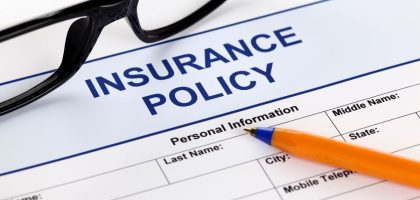Personal Accident Insurance
Personal Accident Insurance
Accidents happen when you least expect them. They can be life-changing in an instant. For this reason, having insurance is important. Unfortunately, many people underestimate the value of having Personal Accident Insurance. This type of coverage can be your lifeline in times of crisis. Personal Accident Insurance offers protection in the event of accidental injury, disability, or death. It provides financial support to help you and your family during difficult times.
Personal Accident Insurance is often overlooked but is an important form of insurance that everyone should consider. It offers peace of mind and helps you to plan for the unexpected. Read on to find out more about this valuable coverage.
Alarming statistics about accidents in India
India is home to some of the most hazardous roads in the world. According to the Ministry of Road Transport and Highways of India, in 2021 a total of 4,12,432 accidents were recorded, of which 1,42,163 (34.5%) were fatal accidents, 2,46,027 (59.7%) were injury (minor and grievous) causing accidents.
According to the latest statistics, 83% of all accidents in India occur due to human errors such as drunk driving, speeding, jumping traffic signals, and overtaking from the wrong side. Among these, drunk driving accounts for around 40% of accidents on Indian roads. Moreover, two-wheelers, especially motorbikes, are involved in a significant number of accidents in the country.
From the above data, we can understand how personal accident insurance policy plays an important role in such a scenario.
Types of Personal Accident Insurance Policy
There are two types of accident insurance policies namely
1. Individual Accident Insurance
2. Group Accident Insurance
Individual Accident Insurance Policy provides essential coverage for unforeseen circumstances, such as accidents, which can result in life-changing injuries or even death. This policy guarantees financial assistance to individuals in need, providing them and their loved ones with a safety net in case of unexpected events.
The security and peace of mind that this policy provides are unmatched, especially during such turbulent times. With this policy in place, individuals can focus on their recovery and healing, without the added financial burden.
On the other hand, the Group Accident Insurance Policy offers a practical solution for businesses to protect their employees. With a comprehensive policy in place, the group of individuals, such as employees, is safeguarded against accidents that can occur on the job or off-duty.
Such insurance policies assure employees that they are valued and taken care of, increasing their motivation and loyalty toward their employer. This insurance policy creates a sense of security and confidence amongst the employees, leading to higher morale, job satisfaction, and ultimately a better work environment.
Features of personal accident insurance policy
When it comes to safeguarding yourself against unforeseen accidents, a personal accident insurance policy is your best choice. This type of policy offers a host of benefits that are specifically designed to support you and your loved ones in case of an accident.
Some of the key features of a personal accident insurance policy include
1. Comprehensive coverage
The policy covers a range of accidents, including disability, loss of limbs, death, and disfigurement. Additionally, it also provides compensation for any loss of income resulting from the accident.
2. Worldwide coverage
Personal accident insurance offers coverage worldwide, which means you are protected even if you are travelling abroad.
3. Easy and affordable
These policies are easy to understand and affordable, making it a convenient option for everyone.
4. Customisable policies
You can tailor the policy to your specific needs and requirements. This means that you can opt for additional coverage such as hospitalisation, critical illness, or accidental medical expenses.
5. Rehabilitation expenses
Personal accident insurance policies can also cover rehabilitation costs such as physiotherapy, occupational therapy, and counselling.
With its comprehensive coverage, affordability, and customizable options, it is the perfect solution for anyone who wants to ensure financial protection against unforeseen accidents.
| Parameters | High Sum Insured Plan | Low Sum Insured Plan with Top-Up |
| Premium | For those seeking extensive coverage, a high-sum insured plan provides robust protection, although premiums may be relatively higher. | Alternatively, a low-sum insured plan paired with a top-up plan offers pocket-friendly premiums with the flexibility of additional coverage. |
| Deductible | Expect a lower deductible if applicable, ensuring quicker coverage activation. | Deductible amounts can be higher, as the top-up coverage triggers only after fulfilling the deductible. |
| Claim Process | Claim processes are often simple and mostly cashless, providing ease during challenging times. | While still straightforward, the claim process might not always be cashless, requiring initial payment before reimbursement. |
Secure your peace of mind with personal accident insurance, tailored to your coverage needs and financial preferences.
Eligibility criteria to buy a personal accident insurance policy
Eligibility criteria for purchasing a personal accident insurance policy typically include:
1. Age
The applicant must be between the age group of 18 and 65 years. However, age limits may vary by insurer and specific policy.
2. Health Condition
Most policies do not require a medical examination. However, pre-existing health conditions may affect eligibility or coverage.
3. Occupation
Certain high-risk occupations may have specific policies or eligibility restrictions. Insurers may classify occupations into risk categories.
4. Policy Specifics
Eligibility can also depend on the specific policy’s terms and conditions, such as coverage amount and duration.
5. Documents Required
Various types of claims require different sets of documents. While these documents generally apply, it’s essential to note that specific requirements may vary depending on the insurance provider:
◦ Completed claim form
◦ Death certificate
◦ Disability certificate issued by a medical professional
◦ Post-mortem report
◦ Medical practitioner’s report
◦ Copy of the First Information Report (FIR)
◦ Medical certificate
◦ Bills for medicines
◦ Discharge summary, if hospitalisation occurred
◦ Investigation report
Please be aware that document requirements can differ among insurance providers, so it’s advisable to check with your specific insurer for precise details.
Note: It is essential to review the eligibility criteria of the specific insurance policy you’re interested in, as they can vary between insurers and policies. Additionally, individuals with unique circumstances or requirements may find policies tailored to their needs through specialised insurers.
Major inclusions and exclusions of Personal Accident Insurance Plan
While taking a Personal Accident Insurance Policy, both policyholders and individuals need to be aware of significant inclusions and exclusions. These may vary depending on the insurance provider and specific plans offered.
The major inclusions of personal accident insurance are:
1. Accidental Death Benefit
Coverage in case of the insured’s death due to an accident.
2. Total Permanent Disability Benefits
Compensation for a disabling injury that results in the insured’s permanent inability to work.
3. Partial Permanent Disability Benefits
Compensation for specific injuries or disabilities that don’t result in total disability but still impact the insured’s ability to work.
4. Temporary Total Disability Benefit
Financial support during the insured’s temporary inability to work due to an accident.
5. Medical Expenses
Reimbursement for medical treatment and hospitalisation expenses incurred due to an accident.
6. Terrorism Coverage
The insurance policy also encompasses injuries inflicted by terrorists on the insured.
7. hospitalisation Benefit
This provision entails daily monetary payments for a specified maximum number of days if an accident leads to hospitalisation.
The major exclusions of personal accident insurance are:
1. Pre-existing conditions
Injuries or disabilities resulting from pre-existing medical conditions are typically not covered.
2. Self-Inflicted Injuries
Deliberate self-harm or injuries caused while under the influence of drugs or alcohol are excluded.
3. Engaging in Hazardous Activities
Injuries incurred while participating in hazardous activities like extreme sports might not be covered.
4. Non-Accidental Disabilities
Disabilities resulting from illnesses or non-accidental events are usually not covered.
5. Criminal Activities
Injuries sustained while engaging in criminal activities are typically excluded.
6. Injuries Abroad
Some policies may exclude injuries sustained while abroad, so it is crucial to check for coverage during international travel.
Please note that the specific inclusions and exclusions can vary between insurance policies and providers, so it is essential to carefully review the terms and conditions of your chosen personal accident insurance plan for precise details.
Best personal accident insurance plans
Here are some of the top-rated personal accident insurance plans:
1. Bajaj Allianz Personal Guard
Offers comprehensive coverage with multiple options and add-ons.
2. HDFC ERGO Personal Accident Insurance
Provides a range of plans with high coverage limits and flexibility.
3. ICICI Lombard Personal Protect
Offers affordable plans with various coverage options.
4. Reliance General Insurance Personal Accident Policy
Provides extensive coverage for accidents, including permanent disability and accidental death.
5. Max Bupa Personal Accident Plan
Known for its competitive premiums and comprehensive coverage.
6. TATA AIG Accident Guard
Offers a range of plans with flexible options and features.
7. SBI General Insurance SBI Accident Insurance
Provides affordable coverage with various benefit options.
8. Future Generali Accident Suraksha
is Known for its comprehensive accident coverage and flexible plans.
When choosing a personal accident insurance plan, it is essential to consider your specific needs, budget, and the coverage offered by each plan.
Be sure to compare policies and read the terms and conditions carefully to select the one that best suits your requirements.
Benefits of buying ₹15 lakh health insurance
A health plan with ₹15 lakh sum insured will ensure that you and your loved ones have adequate coverage to face any unforeseen medical needs. The following are some benefits of choosing such a plan.
1. Cashless payments
A big benefit of buying a health insurance plan for ₹15 lakhs is the cashless benefits. When you visit a network hospital, as listed by the insurance provider, you will not have to pay for the treatment that you undergo. Your insurance provider and the hospital will directly settle the bills.
2. Comprehensive coverage
A plan with a sum insured of ₹15 lakh will ensure that you and your loved ones have the adequate financial backing to undergo any unforeseen medical challenges in the future. A plan that covers hospitalisation charges, consultation fees, surgery charges, nursing charges, etc. can be a differentiating factor. It will also allow you to preserve your savings since the policy will take care of the expenses.
3. Critical illness
A health insurance plan with ₹15 lakh coverage gives you better preparation against any critical illness that the insured might be diagnosed with. Critical illnesses such as heart attack, paralysis, cancer, etc. can cost a lot for treatment. A health insurance plan with ₹15 lakh coverage will ensure that you can proceed with the treatment. Alternatively, you can also opt for a critical illness rider with the plan. On diagnosis of any critical illness, the insurance provider will pay a lump sum amount, which can be used for the treatment.
4. Tax benefits
Premiums that you pay towards a ₹15 lakh health insurance policy, can also be used to avail of tax benefits. Under Section 80D of the Income Tax Act of 1961, the premium that you pay can be deducted from the total taxable income. For any individual under the age of 60, the maximum cap is of ₹ 25,000 and for any individual above the age of 60, the maximum cap is set at ₹ 50,000.
5. Family floater
A health plan with ₹15 lakh as the sum insured is ideal for a family floater plan. Everyone in the family can benefit from a higher sum insured and use the amount for any health issues during the year. The higher coverage ensures that most medical emergencies can be covered without you having to take any sort of financial stress.
Why choose personal accident insurance?
Personal accident insurance is a financial cushion for individuals who might not be prepared to deal with the long-term costs. These costs can come from an injury or an accident. In most cases, these policies cover a wide range of scenarios, including incidents that occur both inside and outside of the workplace.
Personal accident insurance can provide you with peace of mind in case you experience any type of injury that negatively affects your physical or mental well-being.
So, why choose personal accident insurance? Simply put, because you can’t always predict what the future holds. Having a reliable safety net in place can make all the difference.
Advantages of personal accident insurance policy
Personal Accident Insurance Policy is designed to safeguard you in unforeseen situations. Here are five advantages of getting this type of insurance:
1. Comprehensive coverage
With a Personal Accident Insurance Policy, you can enjoy comprehensive coverage that protects you against all types of accidents, including mishaps on the road, during outdoor activities, or while playing sports.
2. Financial support
In the event of an accident, you will require funds to pay for medical expenses and loss of income due to disability. Personal Accident Insurance provides financial support to cover such expenses, giving you peace of mind and financial stability during challenging times.
3. Tax benefits
Personal Accident Insurance also comes with tax benefits, as you can claim deductions on the premium paid under Section 80C of the Income Tax Act. This can help you reduce your overall tax liability and save money.
4. Customisable plans
Depending on your needs and budget, Personal Accident Insurance policies offer flexible and customisable plans. You can choose a plan that fits your requirements, which can include specific coverage amounts, term lengths, and riders.
5. Quick settlement
Most insurance companies settle claims within a few weeks. If an unfortunate accident does happen, personal accident insurance guarantees swift compensation for your losses.
Why should you buy a personal accident insurance policy?
Accidents are unexpected and can happen to anyone, anywhere, and anytime. In such situations, a personal accident insurance policy can be your best saviour. Here are some reasons why:
1. Personal accident insurance provides financial support during medical emergencies, accidental death, or disability.
2. It helps you and your family to deal with the sudden and unexpected expenses caused by accidents.
3. It also offers coverages for accidental permanent or partial disability, loss of limbs, and injuries leading to permanent disablement.
4. Moreover, you can customise your insurance policy to fit your budget and requirements.
Considering the unpredictability of life, purchasing a personal accident insurance policy is a wise investment that can give you peace of mind and financial security.
Difference between accidental insurance and life insurance
Here are the key differences between Accidental Insurance and Life Insurance
1. Purpose
Accidental insurance provides coverage specifically for accidents and injuries resulting in disability or death due to unforeseen events.
Whereas, life insurance provides financial protection to beneficiaries upon the policyholder’s death, regardless of the cause of death.
2. Coverage duration
Accidental insurance typically provides coverage for a specific term or incident, such as a one-year policy or coverage for a single accident.
Life Insurance offers long-term protection, often for the policyholder’s entire life, with options for a term or whole-life policy subject to the premium paying terms.
3. Payout method
Accidental Insurance pays benefits in the event of accidental injuries, disabilities, or death resulting from accidents only.
Life Insurance pays benefits upon the policyholder’s death, regardless of the cause, as long as the policy is in force and of course, subject to the terms and conditions of the policy.
4. Premium cost
Accidental Insurance premiums are lower compared to life insurance, making it more affordable.
Whereas, life Insurance premiums are often higher due to the longer coverage period and a broader scope of coverage.
5. Scope of coverage
Accidental Insurance limits accidents and injuries; and does not provide savings or investment features.
On the other hand, life Insurance offers a broader range of coverage, including death benefits, cash value accumulation, and potential investment options in some policies.
These distinctions highlight the specific purposes and coverage areas of Accidental Insurance and Life Insurance, making them suitable for different financial needs and priorities.
Life insurance policy vs Accidental insurance policy comparison table
Aspect | Accidental Insurance | Life Insurance |
Purpose | Covers accidents and injuries resulting in disability or death due to unforeseen events. | Provides financial protection to beneficiaries upon the policyholder’s death. |
Coverage Duration | Typically provides coverage for a specific term or incident, such as a one-year policy or coverage for a single accident. | Offers long-term protection, often for the policyholder’s entire life, with options for term or whole life policies. |
Payout Trigger | Pays benefits in the event of accidental injuries, disabilities, or death resulting from accidents only. | Pays benefits upon the policyholder’s death, regardless of the cause, as long as the policy is in force. |
Premium Cost | Generally, premiums for accidental insurance are lower compared to life insurance, making it more affordable. | Life insurance premiums are often higher due to the longer coverage period and broader scope of coverage. |
Scope of Coverage | Limited to accidents and injuries; does not provide savings or investment features. | Offers a broader range of coverage, including death benefits, cash value accumulation, and potential investment options in some policies. |
Difference between Accidental Insurance and Critical Illness Insurance
With a plethora of insurance options in the Indian market, selecting the right one can be overwhelming. This section highlights the key distinctions between Critical Illness Term Insurance and Accidental Disability Policy, helping you make an informed choice.
The nature of the policy
Critical Illness Term Insurance differs significantly from basic term insurance or Accidental Disability Policy. It provides a lump sum upon diagnosis of a critical illness, which can be used for treatment or income replacement.
In contrast, an Accidental Disability Policy offers financial coverage for accidental disabilities, acting as income replacement during adversity.
Coverage offered
Critical Illness Insurance covers acute illnesses such as
- Heart attacks
- Strokes
- Cancer
- Organ transplants.
Accidental Disability Policy covers both short-term and long-term disabilities, providing income replacement and substituting lost income for a specified period.
Duration of payment
Critical Illness Insurance offers a lump-sum payment upon diagnosis, with a waiting period of 30 to 90 days.
Accidental Disability Policies can be short-term or long-term, with waiting periods ranging from 0 to several days, offering benefits for up to 2 years or lifelong coverage.
Benefit payout
Critical Illness policies can provide benefit payouts up to Rs 1 crore, depending on premiums and additional benefits.
Accidental Disability Policies offer weekly benefits for short-term disability and a benefit payout of 125% of the sum assured for long-term disability.
Eligibility
For Critical Illness Insurance, applicants typically must be between 18 and 65 years old, with mandatory medical checkups for those above 4
Accidental Disability Policy applicants should be between 18 and 70 years old.
Who can buy it?
You may opt for Critical Illness Insurance if you have a family history of critical illness, or you are the primary breadwinner, you are over 45, or work high-pressure jobs.
Accidental Disability Policy suits individuals who drive frequently, are sole earners, lack employer coverage, or are managing debts. Make your choice wisely based on your unique circumstances and needs.
Difference between Personal accident insurance and Term insurance
Term insurance covers all types of natural deaths. In contrast, Personal Accident Insurance specifically addresses deaths or injuries resulting from accidents. Similarly, Term insurance provides death benefits to the insured person’s nominees in case of their natural demise. Personal Accident Insurance, conversely, pays death benefits solely in the event of the insured person’s death due to an accident. Depending on the policy terms, it may also cover medical treatment costs for accident-related injuries.
How much does Accident insurance cost?
The premium varies depending on your selected plan, age, demographics, occupation, and occasionally, your medical history. Nevertheless, it is advisable to choose a sum insured amount that is 100 times your monthly income.
How much accidental Insurance coverage is sufficient?
A general guideline is to have coverage that is 100 times your income per month. For instance, if your monthly earnings are Rs. 50,000, you can consider a personal accident cover of Rs.50,00,000. This ensures financial security for various contingencies like education, marriage, loan repayment, and sustaining income for your spouse, provided you renew the policy promptly.
How to File an Accidental Insurance Claim?
To initiate the claims process, promptly notify the insurance provider within the stipulated time frame. You may receive a claim reference number. When notifying a claim, you should provide the following information:
- Your phone number
- Policy number
- Incident location
- Time and date of the accident
- Name and information of the injured insured person to establish contact
- A concise report of how the accident or loss occurred, including location details
- The extent of the loss
It is crucial that the nominees like all dependents and family members, like your spouse, are also aware of these details in case of an accident and emergency like a demise, as it can guide them on the necessary steps to take.
Documents required to raise a claim for personal accident insurance
To raise a claim for personal accident insurance, please ensure you have the following documents:
- A correctly filled and signed claim form
- A copy of your insurance policy
- An FIR for accidents and, for death claims, a post-mortem report
- For disability claims, a doctor’s certificate
- A certificate of death if applicable.
In case of a disability or death claim, you need to submit the following documents to the insurance company:
- Death certificate
- Post-mortem report
- FIR report
- Medical certificate
- Medicine bills
Keeping these records accessible for your family members is essential. In case of an unexpected event resulting in a coma or demise, it ensures they are not left in a vulnerable position, and potential benefits are not left unclaimed.
Additional benefits of Personal accident insurance policy
Certain insurers may offer these benefits within the basic plan, or you can acquire them as add-on coverage by paying an additional premium:
1. Hospital daily cash
Provides a daily cash allowance during accidental hospitalisation, with coverage limited to a specified number of days as outlined in the policy terms.
2. Ambulance expenses
Covers compensation for ambulance charges when transporting the insured to the hospital post-accident.
3. Burns
Provides compensation for accidental burns.
4. Broken bones
Offer fixed compensation for bone fractures or damage.
5. Transportation or repatriation of mortal remains
In the event of the policyholder’s accidental demise, the nominee receives expenses for repatriation and transportation of mortal remains, including costs related to cremation ceremonies.
6. Education advantage
Covers the education costs of dependent children up to a specified limit in the event of the policyholder’s unexpected demise.
7. Family transportation allowance
is Applicable when the hospital is distant from the insured’s residence, covering transportation expenses incurred by immediate family members to reach the insured.
8. The loan protector
Pays a lump sum amount specified in the policy schedule in the case of unexpected demise or lifelong disabilities.
Tax benefits under a Personal Accident Insurance Policy
Tax benefits are not extended under Section 80D of the Income Tax Act, 1961 for premiums paid towards personal accident insurance plans covering physical disability, accident demise, or dismemberment. It’s vital to prioritize insurance decisions based on safety and protection, not being swayed by tax implications. Note that tax benefits are subject to alterations in tax laws.
How Can Accidental Insurance Help?
Accidental insurance can be a vital financial safeguard in unforeseen circumstances. It provides support by offering compensation in case of accidental injuries or death. This coverage assists individuals and their families by providing financial stability during challenging times and helping cover medical expenses, loss of income, and other related costs.
Frequently Asked Questions
If you require hospitalisation following an accident, you can opt for additional coverage by paying an extra premium.
The grace period for renewing critical illness insurance policies may differ among insurance companies, but typically, most companies provide a grace period of 30 days.
In contrast to life insurance, Personal Accident insurance does not necessitate a medical examination. Therefore, factors like pre-existing conditions, lifestyle choices, or occupation will not affect your eligibility or the premium you are required to pay.
Leading Health Insurance Companies





Latest Blogs
Introduction At the time of renewing or buying car insurance, people generally have two main options in front of...
Introduction A lot of people treat insurance as a last-minute purchase and buy it only because it feels necessary in...
Whether it’s a little scratch or a big accident, a car insurance claim can save time, money and a...
Before buying term insurance, most people ask how much cover do they really need. You can’t buy a plan...
Introduction Insurance planning is not a challenge but can surely feel confusing with so many options, terms and mixed...
Introduction A lot of people treat insurance as a last-minute purchase and buy it only because it feels necessary...
Insurance is a financial protection that secures your family, health and assets against unexpected events. The market today is...
With every year, healthcare is becoming more expensive. Whether it’s a routine check-up or a surgery, medical bills are...










